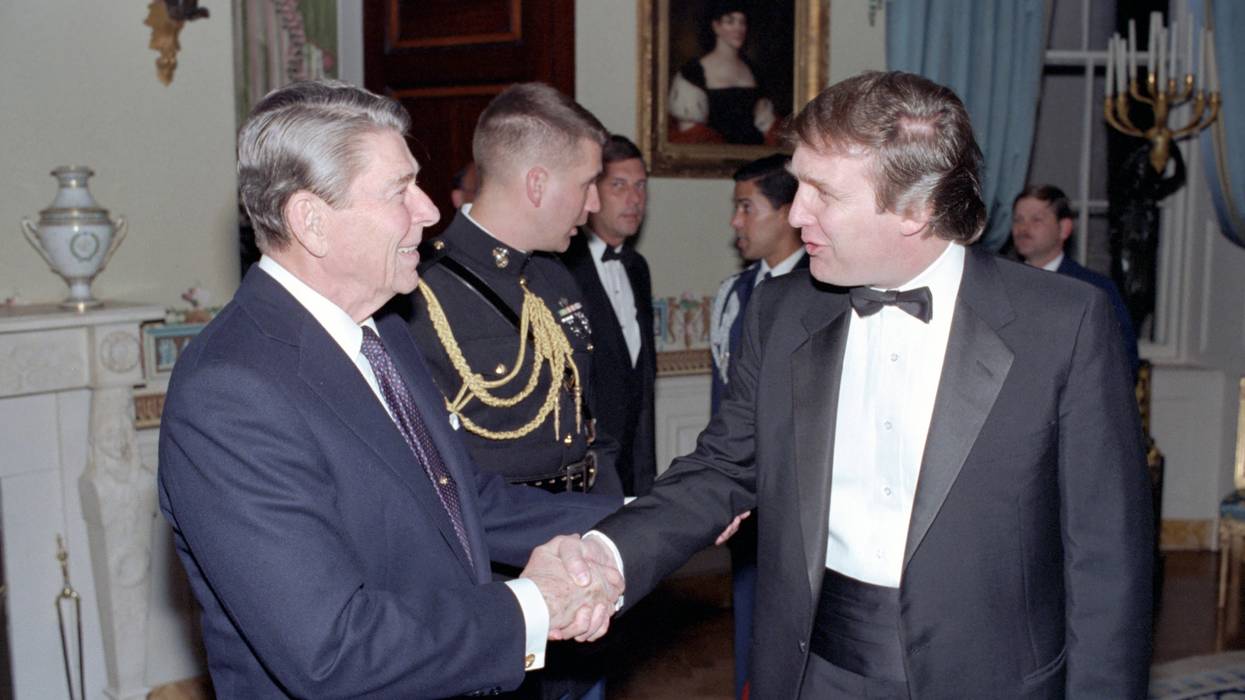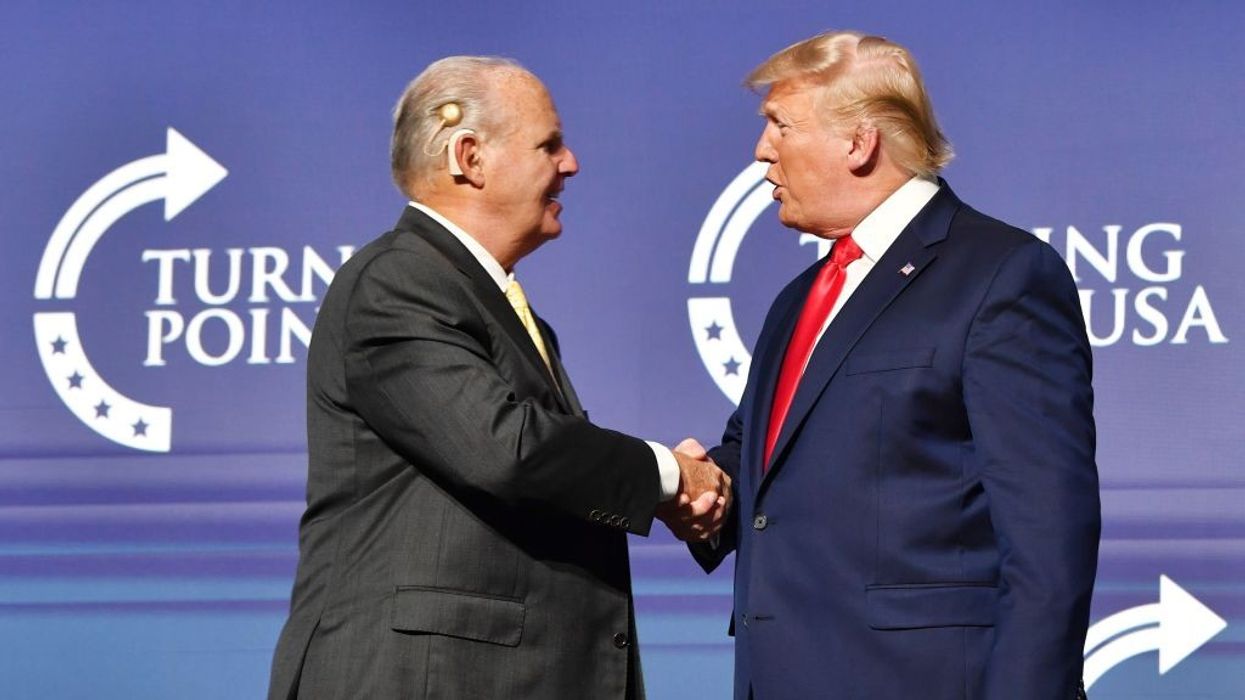You could buy or lease radio stations for less than a party might spend over a four-year electoral cycle on advertising, so why not simply acquire a few hundred stations across a dozen or more states and program them with rightwing talk radio 24/7?
This became particularly easy after Bill Clinton signed the neoliberal Telecommunications Act of 1996 that ended limits on how many radio or TV stations a single corporation or billionaire could own. Within months of that bill passing into law, Clear Channel and other networks had gone from small regional groups to massive nationwide radio empires.The strategy worked, and today there are over 1,500 rightwing radio stations in America, along with another 700 or so religious stations that regularly endorse Republican memes and candidates for office.
I wrote the original business plan for Air America Radio back in December of 2002 with an article I published that month on Common Dreams.
Right-wing talk radio has been integral to Republican strategy for decades. In 1994, when Newt Gingrich took control of the House of Representatives, he understood the power of talk radio.
“For the first 100 days of the congressional session,” writes Randy Bobbit in his book Us Against Them, “talk radio hosts broadcast live from the capitol building…. When the talk radio throng outgrew the working spaces available, Gingrich allowed some hosts to work in the extra space in his office.”
George W. Bush repeatedly invited talk-radio hosts to broadcast from the White House lawn, although Obama cancelled the tradition; Trump then continued the Republican seduction of the media that dated back to the 1990s.
And the GOP hold on most of American radio seems pretty unshakable.
A few years ago, a billionaire acquired one of the largest networks of these stations (800+ stations) and a senator I’ve known for years invited him and me to meet in his office near the US Capitol. The Senator asked the billionaire — who then owned several hundred stations programming exclusively rightwing content — if he’d ever considered putting some progressive content on the air.
Right-wing talk radio has been integral to Republican strategy for decades.
The billionaire leaned back in his chair, took a deep breath, tented his fingers in front of his mouth, and then said, carefully but emphatically:
“I’ll never put anybody on my air who wants to raise my taxes.”
A few years earlier, I’d sat at lunch at a Talkers Magazine conference with a vice president of what is arguably the most influential of the rightwing radio station networks; the company had started out as a bible publishing business and moved from there into radio and then into political radio.
I asked him if he’d consider putting a progressive show on any of his stations (they were all 100% conservative talk) and he bluntly told me it was “never going to happen” because, he said, “It’s impossible for a liberal to be a true Christian.”
Along with Fox “News,” rightwing talk radio is the main way Republicans have seized and held control over multiple red states. History shows that putting progressive programming on the air in those states could reverse that trend.
Back in 2008, Air America was broadcasting on 62 radio stations that covered a large part of America, including rural areas that had never before experienced progressive talk radio. Most of the stations were leased from Clear Channel, which also owned and programmed rightwing radio on several hundred of its stations.
I’m not aware of any studies proving or disproving the hypothesis, but I believe a large factor in President Obama’s election in 2008 was Air America promoting his candidacy relentlessly. It certainly didn’t hurt: we reached millions of people every single day during that election.
Liberal talk radio carried important messages that were vital to the rural parts of America. That we are all interdependent; that none of us can entirely stand alone unless we are fabulously rich, which is the sales pitch the billionaires try to sell us with their libertarianism; that without government supports and a social safety net, farming would be so vulnerable and financially dangerous (particularly with our weather emergency) that it wouldn’t be viable.
Think about it — political campaigns will pay thousands for a minute of advertising, and find that to be so effective that they continue to buy ads year after year. If that minute can be so influential, how about a host — who’s built a relationship with his or her listeners — telling them dozens of times a day who they should vote for and why? You literally can’t buy promotion like that; you have to buy the station instead.
I wrote the original business plan for Air America Radio back in December of 2002 with an article I published that month on Common Dreams.
Sheldon and Anita Drobney, two venture capitalists from Chicago, read the article and called me up; the next thing I knew I was in the Midwest helping them and Jon Sinton game out how to bring a progressive network into being. Sheldon wrote about it in his book, The Road to Air America, including reprinting my original article.
Impatient to prove the concept of progressive talk radio could work, I started my own program on a local Vermont station in March, 2003, and then moved it to a radio network in 2004. When Air America came online in 2005, we moved it to that network and picked up SiriusXM.
Then Mitt Romney decided he was going to run for president. No slouch, Mr. Romney: he understood the power of media and so apparently directed his private equity firm, Bain Capital, to purchase the entire portfolio of Clear Channel radio stations in the summer of 2008.
Within two years, heading toward the 2012 election when Romney challenged Obama, most all of their stations had flipped their programming from Air America to sports. It killed Air America, although my show was the lone survivor and is still on SiriusXM, Free Speech TV, and stations across the country.
Around the time Romney was buying Clear Channel, a group of Air America talent and I met in DC with a group of Democratic members of the House and Senate. We suggested they should reach out to big Democratic donors and encourage them to buy stations, so if Clear Channel ever pulled the plug on our leases we’d still be on the air.
We argued that, just as Republicans have discovered, it would be a lot cheaper than spending billions on advertising every two or four years.
Initially, the response was positive until one of the senators, who later ran for president, threw cold water on the idea, arguing that the “free market” should determine things like who owns radio stations, rather than a political party or people aligned with it.
Time has passed and word has spread. Entrepreneurs across America have bought or started radio stations — some normal, some “low-power FM” that works just fine in urban areas — to carry progressive programming. It’s a growing trend, and there are even rumors that George Soros is investing in the business.
I’ll be the opening keynote speaker for the Grassroots Radio Conference this week in New Orleans; progressive radio station owners, operators, programmers, and talent from more than half the American states will be there. This is a big step.
A Pew study found that 16 percent of Americans get their election-year information from talk radio. In rural states, where radio stations are cheap, people are far more likely to drive long distances and listen to local radio than in cities; flipping smaller red states shouldn’t be impossible if progressives could put up a few good stations in each state.
While Democrats spend over a billion dollars on paid advertising every two years, and several billion every four years, Republicans use this model of long-term trusting relationships with radio hosts to get out the vote for the GOP.
They know the truth of the old advertising saying, “Nothing beats word-of-mouth.” And a recent Neilson survey supports that adage when it found that 92 percent of consumers “believe recommendations from friends and family over all forms of advertising.”
In 2016, right-wing talk radio gave Donald Trump the boost he needed to put him in the White House. The hosts loved him and promoted him relentlessly. The same went for George W. Bush in 2000 and 2004, as talk radio became the primary locus for swift-boating John Kerry.
It works. Every weekday, all across America, people get into their cars and drive to or from work listening to the radio; as the nation’s largest statistics organization, Statista, notes, “During an average week in September 2020, radio reached 90.9 percent of all American men aged between 35 and 64 years of age.”
Radio engages, persuades, and informs — and, when done right, builds trust. And the first rule of politics is that trust wins elections.
In politics, just a few points usually decides winners and losers — and talk radio has reliably delivered that incremental edge to the GOP for three decades.
Democrats must get into the talk-radio game. As the old saying goes, “You can’t win if you don’t play.”


